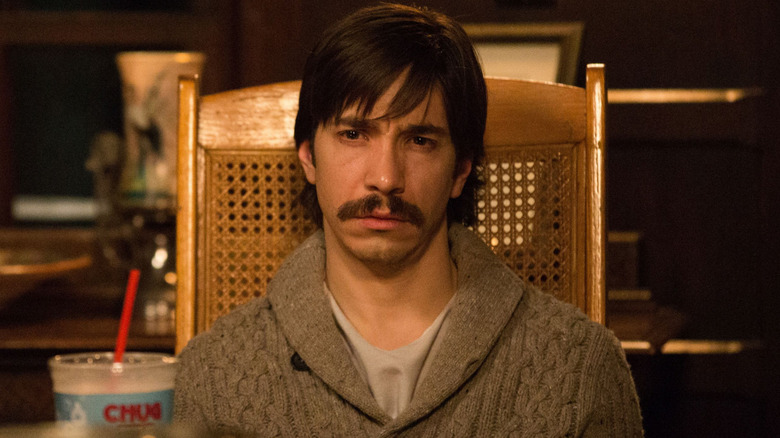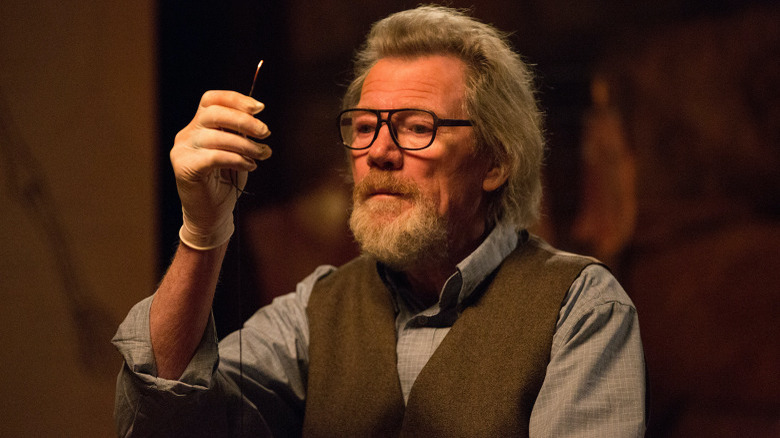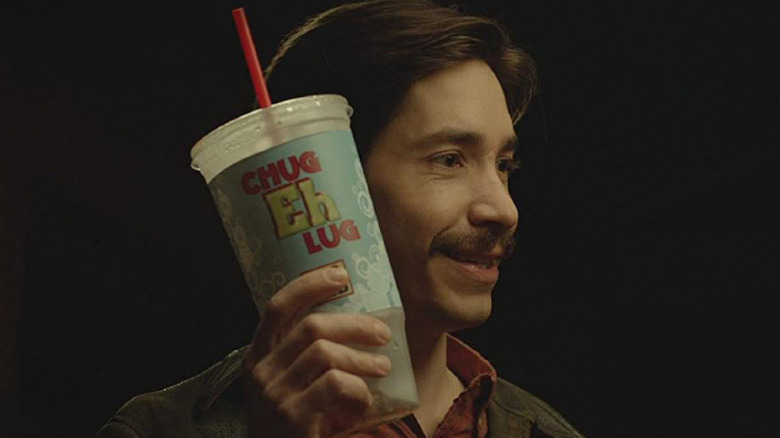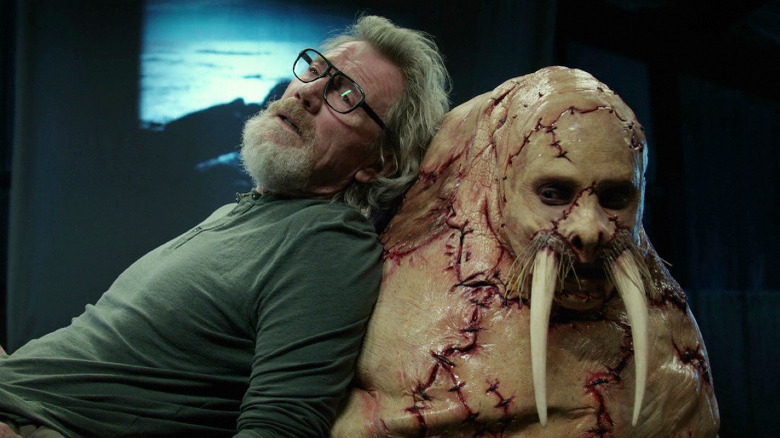Tusk Ending Explained: I Am The Walrus
Kevin Smith's 2014 film "Tusk" has a rather strange origin story. On a 2013 episode of his long-running podcast "SModcast" — the episode titled "The Walrus and the Carpenter" — Smith and his co-host Scott Mosier came across a real-life British want ad from a man seeking a roommate. The want ad described a strange scenario wherein the lodger would be allowed to stay with the man rent-free, provided the lodger dress and behave like a walrus. The man who posted the ad evidently recalled a wonderful time in his past when he had bonded with a real-life walrus and wanted to recreate the feeling.
Smith and Mosier spend 60 full minutes discussing the veracity of the ad and laughing as they imagine this walrus-like scenario as it might appear in a feature film. The two of them become so enamored by their conversation that, by the end of the hour, they resolve to make the walrus film. Their only stipulation was a Twitter hashtag campaign wherein listeners could vote on whether or not such an absurd film should be made. Those in favor could vote #WalrusYes, and those opposed could vote #WalrusNo. The ayes had it.
It was later revealed that the want ad in question was indeed a joke post put out by a notorious Brighton prankster named Chris Parkinson, but it didn't matter. Smith wanted to make his walrus movie. The resulting film is an aggressively terrible surgery horror movie more in line with "The Human Centipede" than any of Smith's previous comedy and romance films. Reactions were mixed. Some critics responded positively to its wild audacity. Some called it one of the worst films of the year. Either way, "Tusk" is certainly unique.
Walrus-core
"Tusk" is, perhaps unsurprisingly, about a pair of podcasters who spend all day snarking at online videos. Justin Long is Wallace, the "leader" of the podcast which he has tackily named "The Not-See Party." His shtick is to travel around the world and talk to people he can potentially mock and embarrass on mic. He has become a minor celebrity with his "shock jock" language and attitudes, and is also a genuinely bad person. Wallace regularly cheats on his girlfriend Ally (Genesis Rodriguez) who is, in turn, having an affair with his co-host Teddy (Haley Joel Osment). Wallace, while investigating a potential story in Canada, finds a posted want ad very similar to the one Kevin Smith and Scott Mosier talked about on "The Walrus and the Carpenter." Wallace decides to investigate, and his feckless gullibility has him failing to notice that this is very much a horror movie situation.
He finds the reclusive Howard Howe (Michael Parks, offering a legitimately great performance) who tells Wallace the story of Mr. Tusk, a beloved walrus he once bonded with as a young man during a time of desperation. Wallace is then drugged and slowly surgically transformed into a walrus against his will. The stitched-up monster Wallace becomes is a horror beyond description. Although the premise is absurd, the walrus monster is a legitimately great horror creation.
It's at this juncture that "Tusk" dramatically changes gears and Smith succumbs to his base comedic instincts. A Quebecois police inspector named Guy LaPointe (Johnny Depp), armed with an outsize accent on par with Inspector Clouseau, goes looking for him. The character is overwhelmingly grating, and Smith lets Depp mug and ramble to his heart's content. The less said about him, the better.
Karmic revenge
Because the surgery used to transform Wallace is so extensive, there's no chance of him returning to his human self. He has tusks, a creature nose, and a bloated patchwork of skin. Additionally, he is robbed of his ability to speak. Wallace is now functionally an aquatic animal. For a while, he still has hope that he will be rescued, but Howard keeps pushing him to behave more and more walrus-like. Howard is eventually bested in walrus-to-walrus combat (Howard slips into a walrus-shaped flesh suit of his own), with Wallace, finally snapping, murdering Howard with his tusks. The final scene of "Tusk" finds Wallace, his sense of identity gone, living in a pool behind a remote rest stop. Ally stops by to feed him and pay respects to the man he once was.
"Tusk" is a horror-comedy by design, but there appears to be more at work beneath the surface of its ludicrous premise. The film seems to be offering audiences a karmic sacrifice. One might suspect that it is trying to answer for an entire generation of podcasters, misogynists, and scads of other media-savvy bad actors that became celebrities online from the mid-2000s on.
One might recall Harry Knowles, the crass ultra-geek who rose to fame/infamy in the late 1990s with his ultra-nitpicky, super-crass film commentaries on Ain't It Cool News. Or other edgelord YouTubers like Jake Paul. Or, indeed, any number of other problematic 20-somethings New Media personalities. Many of the YouTubers and podcasters of the time had affected a "shocking," deliberately offensive humor style that leaned hard into sexism and profanity.
Many used shocking language to "kid" sexist attitudes. Others, however, simply used sexist language. The biggest problem is those two things tend to sound identical.
The rise of Gamergate
One must also recall that 2014, the year "Tusk" was released, was also the year of Gamergate, an infamous harassment campaign that — to try to sum it up as succinctly as possible — targeted video game journalists for daring to address sexism in both games and the game journalism industries. Gamergate revealed, among other things, that the sexist and racist fringe-dwellers of the internet had the dark ability to mobilize for purposes of harm. It was an eye-opening moment for many, codifying that many people living online have come to foster dark, horrible attitudes.
All of this stands in stark contrast to Kevin Smith's 1990s work, which was also crass but never punched down, and had a tendency to at least mildly intellectualize its crass humor. This new generation has the crassness of Smith and nothing more.
Wallace seems to be an avatar for New Media stars. He is the voice of mid-2000s podcasting: A horrible person who couches his tendency toward cruelty in winking humor. Smith didn't make an average, unsuspecting victim into a walrus. He made every New Media bad actor into a walrus. Now in his 30s, Wallace still makes the same mocking, gross jokes he did when he was 17. Smith was punishing his peers for refusing to evolve as they grew up. They are, to Smith, mere animals.
So when Ally bids farewell to Wallace and the decent man he once was, she isn't merely saying goodbye to a single person. She is lamenting the passing of a streak of decency in media. This generation is now to be left behind, chewing on fish and wallowing in their grossness. We should all follow Ally, then, and move on.



